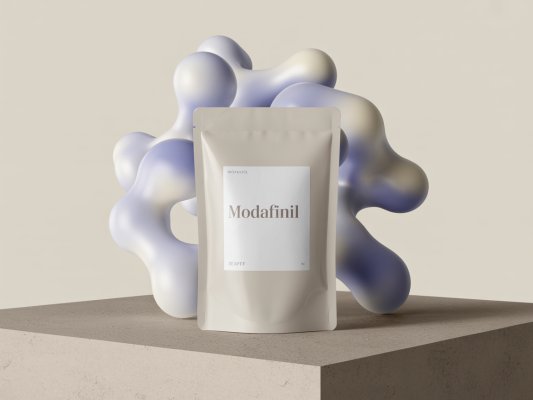
Modafinil
Description
Modafinil, often recognized under the brand name Provigil, is a wakefulness-promoting agent primarily prescribed to manage excessive daytime sleepiness due to conditions like narcolepsy. Originally developed in the 1970s, it gained FDA approval in 1998 and has since been explored for its cognitive-enhancing effects. This article provides a comprehensive yet accessible overview of Modafinil, covering its uses, dosage, side effects, and mechanism of action.
Quick Overview: Modafinil At-a-Glance
- Key Benefit: Enhanced alertness and focus, reduced daytime sleepiness.
- Primary Mechanism: While not fully understood, it's believed to increase dopamine levels in the brain and affect other neurotransmitter systems.
- Best For: Individuals with narcolepsy, obstructive sleep apnea, or shift work sleep disorder.
- Typical Dose Range: 200mg per day, often taken in the morning.
- Key Caution/Consideration: Potential for side effects such as headache, anxiety, and potential interactions with other medications.
Table of Contents
Categories & Effectiveness
Learn about our rating methodologyBrain Health
Dopamine Support
7/10Strong evidence of effectiveness
Cognition
Mental Acuity
7/10Strong evidence of effectiveness
Concentration & Focus
4/10Moderate evidence of effectiveness
Memory & Recall
4/10Moderate evidence of effectiveness
Processing Speed
4/10Moderate evidence of effectiveness
Energy & Alertness
Alertness & Vigilance
10/10Strong evidence of effectiveness
Wakefulness Promotion
10/10Strong evidence of effectiveness
Sleep Quality
Sleep Cycle Regulation
4/10Moderate evidence of effectiveness
Dosage & Side Effects
Recommended Dosage
- Key for You: Those with severe hepatic impairment (liver issues) may require a lower dose of 100mg daily. Consult with a healthcare professional to determine the appropriate dosage for your specific needs.
Potential Side Effects
Bioavailability & Half-Life
Interactions & Stacks
Recommended Products
Serotalin ACTIVE MEN T-Vitaldrink für Männer | Magnesium Komplex Pulver mit Kreatin, L-Citrullin, L-Tyrosin | Vitamin B Komplex | Vegan & Made in Germany | Zitrone-Ingwer
- Rated 5.0 stars by 13 customers
- Premium quality ingredients
texpot Landhaus Servietten 40 x 40 cm - 12 Stück rot-weiß Kariert 5 mm Karo 100% Baumwolle
- Rated 4.6 stars by 106 customers
- Premium quality ingredients
9 Leben® PREMIUM Coenzym Q10 Kapseln hochdosiert - 120x 180mg Q10 [4 Monate Ubiquinon Vorrat] - LABORGEPRÜFT & vegan - ohne Zusatzstoffe
- Rated 4.6 stars by 165 customers
- Premium quality ingredients
As an Amazon Associate we earn from qualifying purchases. Prices and availability are accurate as of the date/time indicated and are subject to change.
Benefits by Use Case
Narcolepsy
Significantly reduces excessive daytime sleepiness associated with narcolepsy, helping individuals stay awake and alert. Dosage is typically 200mg taken in the morning. However, it does not cure narcolepsy and may not eliminate all symptoms.
Obstructive Sleep Apnea (OSA)
Helps to counteract residual sleepiness in individuals with OSA, even when using CPAP therapy. Usual dosage is 200mg, taken in the morning. It's a supportive treatment, not a replacement for addressing the underlying breathing issues of OSA.
Shift Work Disorder (SWD)
Improves wakefulness in individuals working non-traditional hours, reducing fatigue and improving focus during work shifts. Take 200mg approximately one hour before the start of the shift. It doesn't resolve underlying sleep disturbances caused by shift work.
Cognitive Enhancement
Some individuals use Modafinil off-label to enhance focus, concentration, and cognitive performance. The effectiveness varies, and research indicates limited potential for cognitive enhancement outside of sleep-deprived populations. Dosage varies considerably.
Mechanism of Action
Frequently Asked Questions
Where to Buy Modafinil
Based on quality, price, and customer reviews, here are our top recommended Modafinil supplements:
Ashwagandha Gummies, Cortisol Senken, 250mg Hochdosiert, Anti Stress Gummibärchen mit Gaba und Rhodiola, 60 Gummies, Erdbeergeschmack, Vegan, Be So Happy®
- Rated 4.1 stars by 1,767 customers
- Premium quality ingredients
UberFit® BRAIN+ Premium Nootropikum für Konzentration, Gedächtnis & Energie - Hochdosiert mit Cholin, Bacopa Monnieri, Ginseng, Ginkgo Biloba, Coenzym Q10, Koffein, B-Vitamine - 90 vegane Kapseln
- Rated 4.0 stars by 248 customers
- Premium quality ingredients
serotalin ORIGINAL HAPPY ENERGY KAPSELN | Mit Griffonia +Vitamin D3 hochdosiert +B12 +B6 +Phenylalanin +Zink +Chrom +Koffein | 30 vegane Kapseln
- Rated 4.4 stars by 202 customers
- Premium quality ingredients
As an Amazon Associate we earn from qualifying purchases. Prices and availability are accurate as of the date/time indicated and are subject to change.
Summary & Expert Opinion
For those interested in a deeper dive, Modafinil's mechanism is complex and involves several neurotransmitter systems. While it's known to inhibit the dopamine transporter (DAT), increasing dopamine levels in the brain, it also interacts with norepinephrine, serotonin, glutamate, GABA, histamine, and orexin systems. These interactions likely contribute to its wakefulness-promoting and cognitive effects, but the precise interplay remains under investigation. Some studies suggest that Modafinil may act by increasing electrical coupling between neurons in certain brain regions, enhancing neuronal synchrony.
Furthermore, the effectiveness of Modafinil can vary depending on individual factors and the specific cognitive domain being assessed. A systematic review and meta-analysis indicated only a small but significant overall positive effect on cognitive domains like attention, executive functioning, memory, and processing speed in non-sleep-deprived adults. Conflicting study results and methodological limitations highlight the need for further research to fully understand Modafinil's cognitive effects in different populations.
For those considering Modafinil for off-label cognitive enhancement, it's crucial to weigh the potential benefits against the risks and to consult with a healthcare professional to discuss potential side effects and interactions.



![9 Leben® PREMIUM Coenzym Q10 Kapseln hochdosiert - 120x 180mg Q10 [4 Monate Ubiquinon Vorrat] - LABORGEPRÜFT & vegan - ohne Zusatzstoffe](https://m.media-amazon.com/images/I/816Bqn+hhrL._AC_UL320_.jpg)






